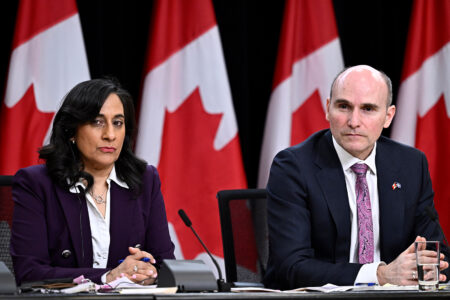
Over the past few years, the world has undergone profound changes, including a dramatic increase in migratory movements, the liberalization of economic markets, the globalization of political structures and the proliferation of advanced technology. These changes are having a considerable impact on Canada and on the role of the provinces within the country. The establishment of a free-trade zone in the Americas, which is to be in place by 2005, and the troubling, and worsening, fiscal imbalance that exists between the federal government and the provinces within the Canadian federation may also be added to the list. These factors have created a new social and economic order, which is why we are considering ways to modernize the Canadian federation and to allow Quebec to participate fully in Canada’s development and growth.
A preliminary report of over 75 pages that was released recently is only the first stage in the process of updating the position of the Quebec Liberal Party (QLP) on Canadian intergovernmental affairs (you can read the report at https:// www.plq.org). A more detailed and extensive final report will follow. These two reports will help the QLP establish its program for the next general election in Quebec.
Although the report is only in the preliminary stages of development, and is the subject of ongoing consultations with Liberal activists and the other citizens of Quebec, several of its underlying principles are clear.
First and foremost, the QLP wants to develop a position based on “interprovincialism,” that is, more fruitful alliances with Canada’s other provinces, intergovernmental co-management and the implementation of a true federal-provincial partnership. The preliminary report is meant to be more than just a constitutional platform.
The report proposes several avenues for arriving at solutions, both constitutional and non-constitutional. It is important to bear in mind that relations within the federation do not consist solely of constitutional negotiations. Much is accomplished outside the constitutional framework, through executive or administrative agreements, court rulings, conventions and intergovernmental negotiations. The affirmation of Quebec and the other provinces need not be tied to the constitutional issue; a lot can be done without touching the Constitution.
Many analysts believe that there is no more to be said about reforming the Canadian federation and that any project with such an objective is doomed to fail. We do not share this pessimistic view. Rather than relaunching the debate on premises based on confrontation, we prefer to rely on mutual trust and real dialogue between the partners in the federation. In addition, rather than opting a priori for general negotiations, we prefer to focus on a combination of specific improvements that are likely to have an immediate effect on the public at large, and to strive to place Canada on a new path paved with different kinds of administrative or constitutional changes. In other words, we know perfectly well that, sometimes, it is best to deal with problems in a limited fashion, rather than to try to do everything at once.
The vision we propose favours the emergence of Quebec’s specificity in Canada and internationally while maintaining the Canadian federation intact. It is important to note that Quebec’s specificity is a fundamental component of Canada’s identity, just like multiculturalism, our differing legal systems (bijuralism) and official bilingualism. However, we also want Quebec to be more sensitive to the needs and claims of the other provinces, and this requires a conciliatory attitude.
Quebec has all the attributes of a specific political community within Canada. In particular, Quebeckers are the only people in North America with a francophone majority. Given this, one can understand why Quebec society displays a constant desire for autonomy and affirmation within Canada, in addition to an irrepressible need to project itself in the world. These two dimensions of Quebec’s “affirmationist” aspirations, one Canadian and the other international, are, in our opinion, the two components of a fundamental paradigm.
It is clear to us that Canada offers Quebec excellent prospects for the future. Still, we are convinced that it is necessary to adjust relations within the federation if we want to end the costly and useless confrontation that has marked relations between Quebec and Ottawa for a number of years. When it comes to reforming Canadian federalism, it seems to us that the main expectations of many Quebeckers concern the constitutional recognition of Quebec’s specificity, a constitutional right of veto for Quebec and a better balance in federal-provincial relations. With respect to this last point, the preliminary report examines different types of reforms that are acceptable and desirable for both Quebec and the other provinces.
Quebec is no longer a closed society, cut off from the rest of the world. It is part of North America and participates fully in the Organisation internationale de la Francophonie. As a member of the Canadian federation, it can take advantage of numerous global forums and has access to important economic markets, including Canada’s large domestic market. Quebec also has unquestioned advantages in terms of human resources, culture, entrepreneurship, natural resources, infrastructure, high technology, and so on.
Quebec is in a privileged position that offers opportunities for growth, and it has every reason to take advantage of those opportunities. To do so, Quebec society must try to effectively meet the challenges associated with modernity and globalization, and reshape itself to take into account its increasingly multi-ethnic character.
Quebeckers must take responsibility for Quebec’s affirmation. However, it seems important to us that the rest of Canada recognize that Quebec’s public institutions have a particular responsibility when it comes to ensuring the development and survival of the French language and culture, and asserting the value of Quebec’s legal, institutional and social specificity. It is wrong to think that Quebec’s singular character threatens Canada’s survival. On the contrary, the expression of Quebec’s originality cannot but enrich Canada’s personality. That is why we feel it is completely legitimate for Quebec to seek recognition of its specificity and firm protection within Canada, as the main guarantor of the French language and culture in North America and a major partner in the Canadian federation.
We intend to propose a true federative vision to Quebeckers. Vision, of course, implies long-term planning. Our planning, that is, our vision of the Canadian federal experience, has four basic components: (1) a new federative spirit that depends on, among other things, balance in the operation of the Canadian federation; (2) participation in Canadian federalism without compromising Quebeckers’ current and fundamental interests; (3) the complementarity of Quebec’s and Canada’s identities; and (4) particular arrangements that reveal just how flexible and adaptable the Canadian federation really is.
In the preliminary report, we also deal with the distribution of tax resources between Quebec and Ottawa, and the redistribution of wealth within Canada. Since the birth of the federation, discussions about finances have characterized relations between the Canadian government and the provinces. Today, it can even be said that fiscal issues have a major impact on federal-provincial relations. The distribution of collective wealth is one of the essential principles of the Canadian federation. The power to levy taxes, federal transfer payments such as the Canada Health and Social Transfer, and equalization are valuable tools for reducing regional disparity in Canada. Quebec, and many of the other provinces, can certainly benefit from these mechanisms.
The preliminary report goes beyond the scope of the Canadian constitutional problem and the traditional vision of federal-provincial relations. This is because we want to offer Quebeckers general tools for affirmation and a coherent vision of their society. All these factors seem to us to be inextricably linked to Quebec’s real strength within Canada.
This global vision of Quebec society is an integral part, and the framework, of the preliminary report. We wanted first and foremost to appeal to Quebeckers as individuals living in a society that is both unique and multi-form, harmonious but multi-dimensional.
That is why the preliminary report focuses first on Quebeckers’ new interests, which are dealt with from different angles. We propose a collective project for Quebec, including an emphasis on individual autonomy, a new association with Aboriginal nations, and the strengthening of ties between Quebec and francophones in the rest of the country to promote the solidarity and vitality of Canada’s francophonie. We also propose specific measures, such as the confirmation of the linguistic status of Quebec’s anglophones, and the full respect of their legislative and constitutional rights and privileges; the quick and just recognition of the academic and professional qualifications of newcomers; and the extension of language programs for immigrants who want to learn French.
Secondly, we emphasize the fact that Quebec’s particular identity needs to be affirmed and recognized in Canada and internationally. We believe that the expression of the originality of Quebec society will only be complete if it occurs internally and externally. These are two essential aspects of the modern manifestation of Quebec’s singularity.
Thirdly, the preliminary report explores the whole issue of rediscovering the true meaning of federalism in Canada. The main element of this rediscovery is the emphasis placed on the value of the Canadian personality and of being a part of Canada. There is also a series of proposals to help Quebec give a significant boost to the development and reform of Canadian federalism.
Fourthly, the report attempts to define the scope of two of the main challenges Canada will face in the future, that is, the consolidation of our Economic Union and the improvement of the Canadian Social Union. These are major issues that Quebec and its partners (the federal government and the provinces) must tackle over the next few years to bring Canadians closer together.
Lastly, the preliminary report reiterates the importance of Quebec leadership within Canada, if only to allow Quebec to play a full leading role and occupy the privileged position it deserves in the Canadian federation.
The overall purpose of the preliminary report is essentially to make citizens react, propose an original and unifying collective project or social contract to Quebeckers, reaffirm the Quebec Liberal Party’s main goal with regard to the full affirmation and recognition of Quebec’s identity, and reiterate the fact that the QLP is a federalist party, one that is determined to allow Quebec to develop as an emerging society in Canada and the world.
After all, it seems to us that the majority of Quebeckers want to remain in Canada but refuse to accept a rigid conception of federalism. Quebeckers also want to improve their quality of life within Canada, not only socially and economically, but also with regard to identity. Fortunately, the situation in Canada has changed over the past few years, so that there is now talk of greater convergence between the interests, concerns and claims of the provinces. This, in particular, seems to provide hope.
It is necessary to consider the spirit of the preliminary report, rather than simply taking a static or technical approach to what we are proposing. We wanted to focus on a series of conditions that would promote the reconciliation of interests that are a priori divergent and the exchange of views among the partners in the federation. In short, we are in favour of federalism that is characterized by partnership and is based on the complementarity of the roles and responsibilities of the two orders of government. We also want Canadian federalism to be better balanced, more flexible and better adapted to the expression of Quebec’s originality.
There is no question that Quebec society has a particular identity, due to its linguistic, cultural, legal and institutional originality, and its general way of life.
Quebec society must clearly affirm its identity within Canada and internationally. In addition, Quebec can legitimately seek recognition of its specificity in the form of an interpretative clause in Canada’s Constitution. This recognition of its specificity could be accompanied by arrangements within Canada.
Quebec society has every reason to assert itself loudly and strongly, on its own and for itself. Still, we feel that the Canadian experience, which is based on common interests and values, can be a source of enrichment and growth for Quebec. And the affirmation of Quebec’s unique identity cannot but strengthen Canada’s personality, as we have previously stated.
In the Canadian federation, it is possible to belong to both Canada and Quebec. This fact cannot be overstressed. Both communities are vital, active and rich in possibilities. We have every reason to be proud of being both Quebeckers and Canadians. These two allegiances are fully compatible, and it is desirable and beneficial to combine them. In other words, Quebec’s participation in Canadian federalism allows Quebeckers to benefit from all the assets of an identity that, although unique, is two-dimensional, being shaped by Quebec and Canada.
With respect to international affairs, it is very important to institutionalize Quebec’s participation in major trade negotiations and certain international organizations, as a member of Canadian delegations. That participation must not be subject to random, arbitrary or irregular decisions. One of the best ways to achieve stable or consistent relations between Quebec and Ottawa with respect to international affairs is to conclude an administrative agreement describing the respective roles of Quebec and federal authorities. The preliminary report also contains very important proposals concerning Quebec’s role on the international scene, within the context of Canada’s foreign policy.
We are advocating a more flexible and more asymmetric approach to Canadian federalism. Various options are available to Quebeckers and other Canadians to achieve this. One of them is the conclusion of administrative agreements in sensitive sectors such as international relations, communications and the environment.
We also recommend improved fiscal, budgetary, social and economic planning by the federal government and the provinces. One aspect of this planning would be the creation of a new Council of the Federation, a permanent executive forum for discussion, and even perhaps intergovernmental decisions.
The proposed Council of the Federation would eventually become a pillar of intergovernmental relations in Canada. The fundamental mission of the Council could focus on the sectors mentioned above, as well as issues as important as the consolidation of the Economic Union and the improvement of the Canadian Social Union. The scope of the Council’s mandate, the nature of its powers and the decision-making process it should follow, if applicable, will be defined in the final report of the Special Committee of the Quebec Liberal Party on the Political and Constitutional Future of Quebec Society.
It seems to us that there is an undeniable need to strengthen the economic and social ties that bind all Canadians. To consolidate the Canadian economic union, we must in particular broaden the scope of the Agreement on Internal Trade, which was signed in 1994. This implies eliminating provincial barriers and restrictions that discriminate on the basis of geographical boundaries.
The preliminary report also devotes a lot of attention to the improvement of the agreement on the Canadian social union. The agreement was signed on February 4, 1999, in a spirit that is conducive to intergovernmental cooperation, so it is a step in the right direction. However, since it is due to be revised by February 2002, we felt it was our duty to point out that it has deficiencies and inaccuracies.
The deficiencies and inaccuracies pertain mainly to the period of notice required for the implementation of new federal pan-Canadian programs and the mechanism for consulting the provinces in this regard; the limitation of federal power with respect to unilateral direct payments to individuals and organizations, and transfer payments to the provinces; the mobility of Canadians; the grievance mechanism; the respective roles and responsibilities of the federal government and the provinces in the sectors covered by the agreement; and the method for preventing and settling disputes. The remarks we have made in the preliminary report concerning the above points allow us to make a constructive contribution to a debate that, in any case, is far from over.
It is very important to understand that, in our opinion, all the provinces must be directly involved in the consolidation of the economic union and the improvement of the Canadian social union, and there must be solid cooperation between the federal government and the provinces. It would be totally unacceptable for the federal government to act unilaterally in this area.
Quebec must once again play a leading role in Canada, especially with regard to the “interprovincialism” that is becoming more apparent and is exemplified by the provinces’ increasingly convergent interests and claims.
This leadership is all the more appropriate since a number of changes must be made to specific aspects of Canadian federalism. The changes we propose in the preliminary report are as follows:
- Changes related to the appointment of justices to the Supreme Court of Canada, who would still be chosen by the federal government but from lists of names submitted by the provinces. In case of an impasse, it would be necessary to provide for a simple mechanism that would allow the federal government to proceed with the appointment, within a reasonable period of time, in order to fill a vacancy.
- The “constitutionalization” of the current composition of the Supreme Court of Canada (nine justices), including the civil-law component (three justices from Quebec).
- Entrenchment in Canada’s Constitution of a “regional veto,” which would be given, not only to Quebec, but to Ontario, British Columbia, the Prairie region and the Atlantic region, and would replace the current “7/50 formula” with respect to all constitutional amendments that are not currently covered by the right to opt out provided for in subsection 38(3) of the Constitution Act, 1982. However, the “7/50 formula” would continue to cover all constitutional amendments to which the right to opt out currently applies. The regional veto could also replace the unanimous consent rule provided for in section 41 of the Constitution Act, 1982.
- Extension of the financial compensation provided for in section 40 of the Constitution Act, 1982 to cover all matters, rather than only “education or other cultural matters.” In the context mentioned in the previous point, the extended financial compensation would only apply in cases where the right to opt out from subsection 38(3) of the Constitution Act, 1982 also applies.
- General limits on the federal spending power that could eventually be the subject of express constitutional provisions.
- The consolidation of Quebec’s powers in the area of immigration, especially through the integration of the MacDougall-Gagnon-Tremblay Agreement into Canada’s Constitution.
- A better partnership between the federal government and Quebec, which could lead, among other things, to the conclusion of administrative agreements related to criminal law, fisheries, correctional services, electronic commerce, support of scientific research, regional development and assistance to small business.
- The redistribution of the tax base between Ottawa and the provinces, and the recovery of tax points by Quebec and the other provinces.
We also stress that it is essential for Quebec to make maximum use of the powers it currently has pursuant to sections 92, 92A, 93, 94A and 95 of the Constitution Act, 1867. Quebec must also take firm control in the following areas: culture, health, social affairs, income security, energy, forests, mines, tourism, public housing and recreation.
The preliminary report also covers Senate reform. We do not want to make categorical statements, and still need to pursue our discussions and consultations on this matter; nevertheless, we have proposed that the Senate be reformed so as to better reflect the interests and concerns of the provinces. The feeling of alienation in the West has not gone unnoticed, far from it, and we intend to take it into account in any proposal related to Senate reform.
The preliminary report has three main pillars. First, we want to allow Quebec to remain autonomous within Canada; that is, we want to defend its legislative powers when necessary and to try to extend its constitutional authority. Secondly, we want Quebec to once again play a full leading role in Canada, as it has done in the past. Finally, we are counting on the affirmation of all aspects of Quebec’s particular identity, both in Canada and internationally.
We are proposing a viable choice to Quebec society, an action plan based on Quebec’s affirmation, autonomy and leadership within Canada. We want to re-emphasize the value of the Canadian federation and strengthen Quebec’s place in it.
It goes without saying that Canada offers a guarantee of prosperity. Nevertheless, it seems critical that our political and constitutional system be evaluated not only on the basis of its ability to ensure the economic well-being of individuals, but also on the basis of its capacity to allow individuals to fulfill themselves socially, linguistically and culturally. We are convinced that Canadian federalism, as profitable and effective as it may be from the point of view of macroeconomic management, cannot really serve as a model for the rest of the world unless it is able to fully develop all Canadians’ human potential and ensure Canada’s own development in conjunction with the affirmation of Quebec’s specific character.
We want change in order to modernize Canada. We propose that Quebec’s status be strengthened within the Canadian federation. We want to involve Quebec in a dialectic of affirmation and to strive to rediscover the true meaning of federalism in Canada.
Our intention is to work on a constructive project with all the partners in the federation, in order to improve our constitutional and political framework. To this end, we are setting realistic and progressive objectives that are likely to be accepted by Quebec and the rest of Canada and to further the evolution of our federation.
Photo: Shutterstock









